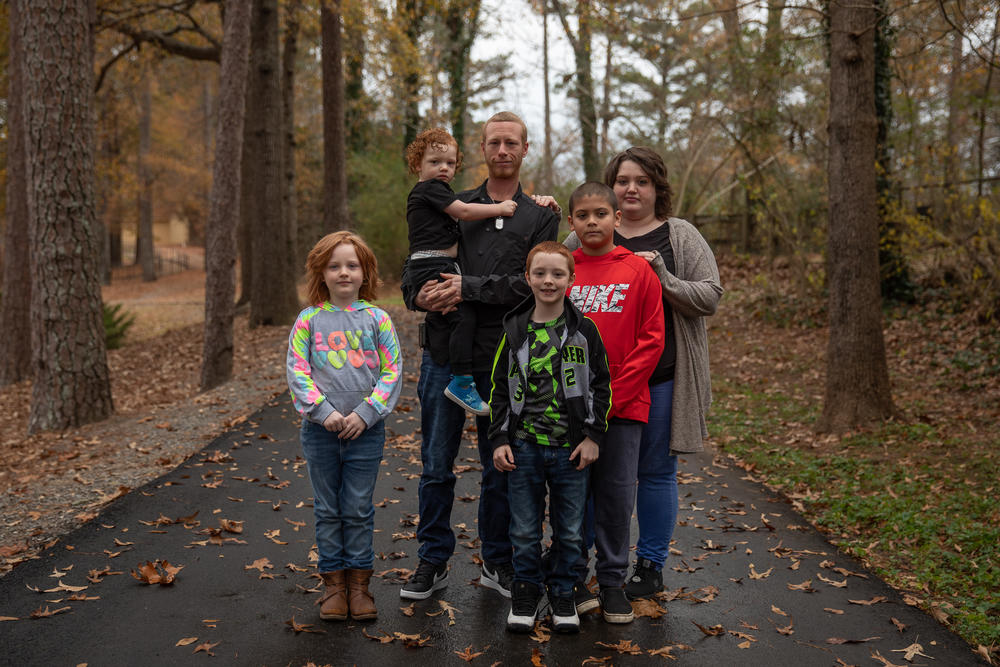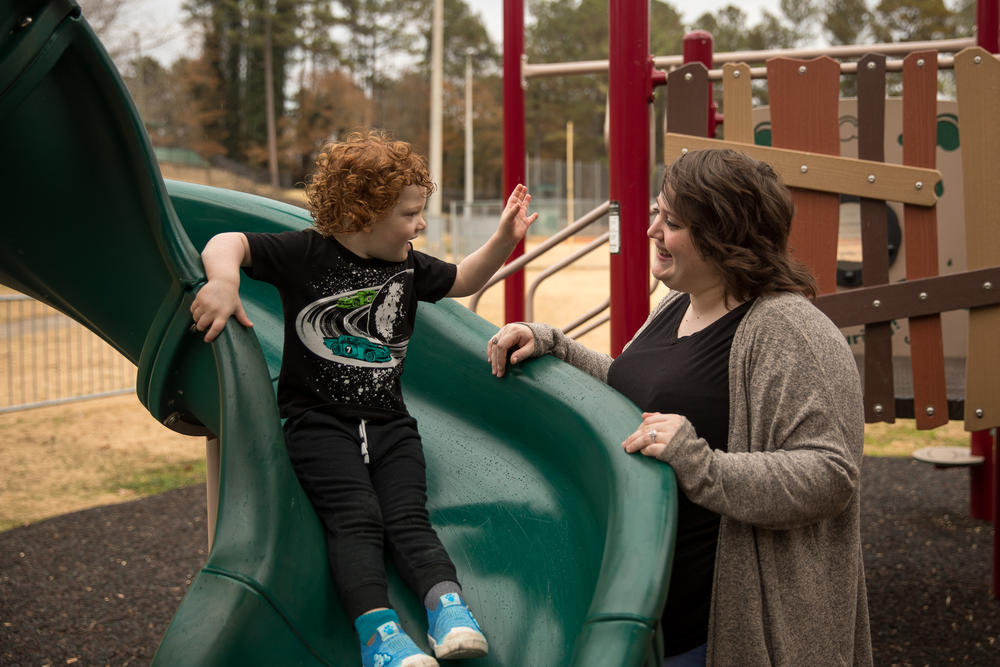By Riley Bunch
Original article: https://www.gpb.org/news/2021/12/14/the-covid-era-child-tax-credit-saved-her-family-now-she-and-others-fear-the-worst
Hannah Ochoa was near her breaking point. The 29-year-old Marietta mother of four young children was struggling to pay for rent, food, diapers, asthma medication — everything.
In the past few years, her family had faced multiple evictions, a fire that engulfed a motel they were living in at the time and, most recently, a terrible car crash that left her fiancé with two broken hands and out of work.
“We just continued to suffer losses,” she said. “We never recovered from it.”
At the same time, the weight of the pandemic slowly crushed the pocketbooks of families across the nation and pushed them near a financial point of no return — Ochoa included.
With her fiancé unable to work, the stay-at-home mom was thrust into the workforce, taking a job at a fast food restaurant to help pay some bills. She wasn’t sure how long she could sustain it.
But then, she said, an unexpected $800 dropped into her bank account. The extra cash was thanks to the child tax credit passed as part of the federal COVID relief package to help families like hers.
The funds kept a roof over the family. They used the money to go toward their $1,000-a-month rent.
“If that hadn’t happened, when it did, when he broke his hands, I would have just dropped to my knees and cried,” she said recalling when the money first appeared. “I didn’t want to watch my kids suffer anymore.”
More than $2.6 billion has been distributed to Georgia families since the program began in July 2020, according to the U.S. Department of Treasury. The money has helped more than 1.2 million households across the state.
Families have said they used the money toward various essentials — ranging from rent to child care, food to flat tires. During the stressful holiday season, the money eased worries of having food on the table for Thanksgiving and being able to buy presents for Christmas.
“It was a lifesaver,” Ochoa said.
At the height of the COVID-19 pandemic, Congress backed an enhancement to the longstanding child tax credit program, historically doled out when Americans file their taxes.
After the devastation wrought by the virus, lawmakers passed the American Rescue Plan in a party-line vote, which made the extra federal money available to the country’s poorest families, who originally did not make enough to file taxes and qualify.
Payments were also immediately disbursed — up to $300 a month per child for the rest of the year.
For Ochoa, that money meant hope for some financial stability. But the extra federal support for struggling families like hers is about to run out.
The last scheduled payment will hit bank accounts on Dec. 15. Unless Congress votes to pass President Joe Biden’s sweeping Build Back Better package, Georgia’s neediest families will start the new year without the financial safety net.
The bill has already passed the House, but is stalled in the Senate as congressional lawmakers hash out other agenda items. The child tax credit provision is considered relatively safe in the final bill, but the package itself faces an uphill battle in the Senate where fiscal conservatives say they don’t support Biden’s $2 trillion plan.
With the legislation crawling through Congress, all families can do is wait.

U.S. Sen. Raphael Warnock said he’s working to make sure families aren’t left empty-handed. The Georgia Democrat grew up in the projects of Savannah and often recalls his own family’s financial hardships during his upbringing.
“I’m going to be doing everything I can to get this bill across the finish line,” he said, “so that come Jan. 15th, these folks receive their payment.”
‘Largest tax-cut in history’ in jeopardy
The new version of the child tax credit that passed the U.S. House extends the program through 2022 for all families and becomes a permanent fixture for those with the lowest income.
Warnock told GPB News that he’s pushing his colleagues to get the massive legislative package passed “as soon as possible,” while Senate Majority Leader Chuck Schumer has indicated he wants it done sometime before Christmas.
Warnock called the program “transformational” for Georgia’s neediest families.
“This is the largest tax cut for working American families in our country’s history,” Warnock said. “It will literally cut child poverty in our country in half. You can’t cut child poverty in half one year, then go back and double it the next year, which is why we must extend this through the Build Back Better Program.”
The senator said he doesn’t expect major changes to be made to the House version in the upper chamber.
But the tax cut comes with a $190-billion sticker shock for some lawmakers, particularly Republicans who have blasted Biden’s spending, especially at a time of rising inflation.
For progressive policy experts, the numbers are clear: 165,000 children would be lifted above the poverty line, said Ife Finch Floyd, senior economic justice policy analyst for the Georgia Budget and Policy Institute.
“Particularly in Georgia, this would benefit 2.3 million children,” Finch Floyd said. “I think the benefit just dwarfs any kind of arguments against the child tax credit.”
The extra funds have also kept some Georgians from being forced out of their day jobs.
Prior to COVID shutting down in-person events, Conyers resident Pasha Benjamin ran a photo booth business in addition to her day job. The combined income, along with her husband’s, made the couple confident that they could start a family.
Benjamin gave birth to their first son at the height of the pandemic. When in-person events shut down, her photo booth rental business collapsed.
The young mother nearly quit her day job, unable to justify the spending on child care.
But with the $300 from the child tax credit program, Benjamin was able to keep her job.
“I was scared; just quitting your job just sounds ludicrous sometimes,” she said. “I’m really pretty sure I would have had to quit because I don’t make enough to justify someone else taking care of my kids.”
The pandemic has propelled a mass wave of women to leave the workforce — during spring 2020, about 3.5 million mothers of school-aged children left work, according to the U.S. Census Bureau.
Benjamin said she believes cutting the benefit to struggling families will only lead to more people quitting their jobs, especially women, to save money that would otherwise be spent on child care.
“This is The Great Resignation,” Benjamin said. “And if you want it to continue, stopping that tax credit is just going to add more fuel to the fire.”
Julia Callahan was one such mother forced to leave her job unexpectedly.
Callahan has one young son and is on bed rest for a high-risk pregnancy after having a miscarriage last year. With the health complications of having another child, the 24-year-old had to leave her job, cutting her family’s income in half.
The additional dollars from the child tax credit, she said, has been vital in keeping her family afloat.
“It’s just been a comfort for us knowing that we can have an extra income when I physically cannot work and that income can go exclusively to my child,” she said.
Callahan, a resident of Macon, went from working 50 hours a week and attending school to being restricted to her home. While on bed rest, she watches from her phone as Democrats and Republicans bat back and forth over the Build Back Better package in Washington.
She said she worries that the stall has disheartened families who rely on the tax credit to get by.
“Politicians might not get the chance to talk to people one-on-one about the impact that it makes, but it definitely has made a huge impact for families like mine,” Callahan said. “The longer it takes, the more I feel like people want to get discouraged or give up. And this is really important. I don’t think that anybody should give up their fight in it because it’s really made a difference.”

Finch Floyd, with the Budget and Policy Institute, pointed to the potential long-term impact provided by the extra money. A childhood with more resources, she said, leads to more success as an adult.
“We know that when you invest in children, giving families with low income and very young children more resources, that pays dividends in the long run for children’s lives,” she said.
But if payments stop, a slowdown in historic strides in child poverty reduction are almost certain, experts say, and lawmakers would lose ground in efforts to address racial disparities, as analysis suggests children of color have most benefited from the program.
“There certainly was a hope that these enhancements of higher benefits and whatnot would be extended permanently,” Finch Floyd said. “But even what’s in the House version would have a huge impact on all children, but most specifically children of color.”
The Center for Budget and Policy Priorities estimates that some 353,000 children under 18 in Georgia are at risk of slipping back below the poverty line or deeper into poverty if the tax credit isn’t extended.
Ochoa knows her four children would be among them.
At Shaw Park in Marietta, where Ochoa often takes her rambunctious gaggle of children, she said she wishes lawmakers would recognize families who have been struggling long before the pandemic added another road bump.
“I can’t even express everything I feel right now about it because it’s just mind-blowing,” she said of the possibility of a lapse in extra funds next month. “It’s just heartbreaking.”


















